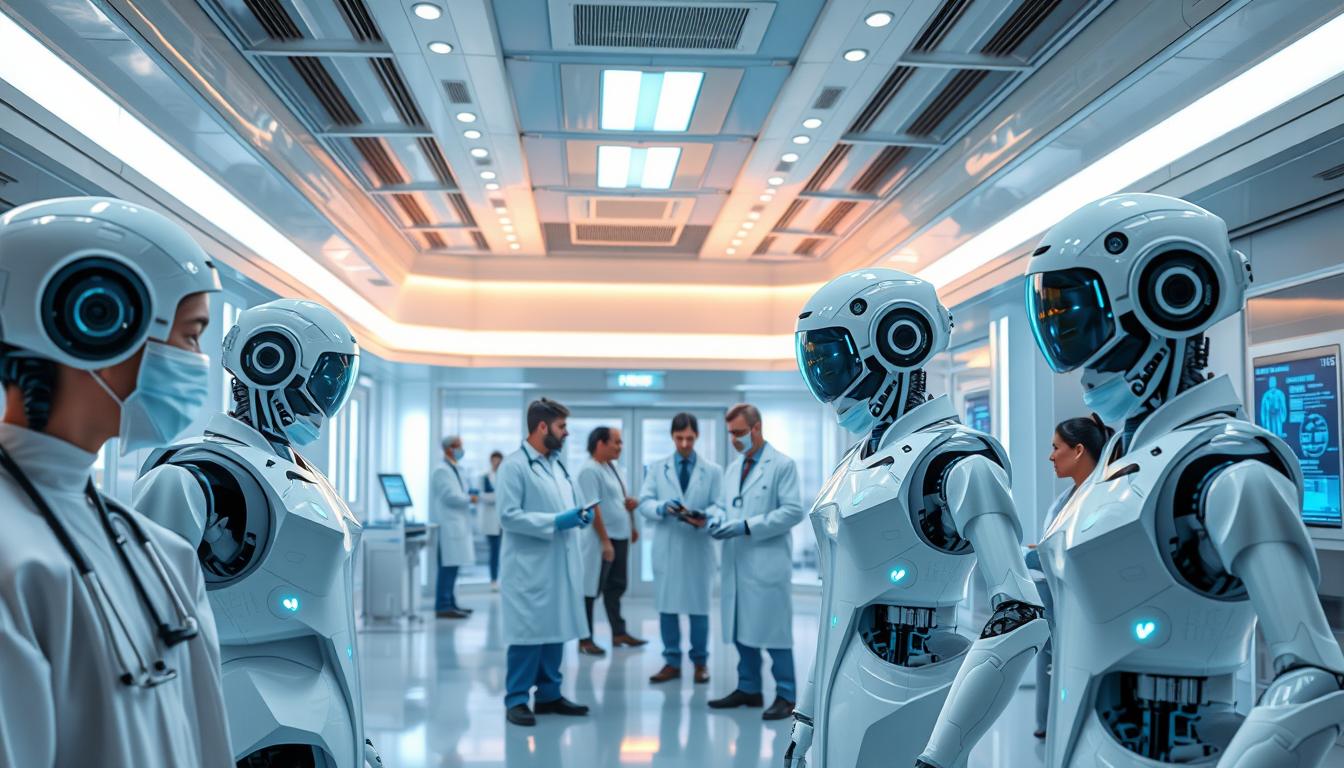The global artificial intelligence market is expected to grow twentyfold by 2030, reaching almost two trillion US dollars. The AI healthcare market is set to grow significantly, from $11 billion in 2022 to $188 billion by 2030. This change is making healthcare systems more efficient, accessible, and focused on the patient.
AI automation in healthcare is changing the industry, solving old problems and opening new doors for patient care. It’s improving clinical decisions, making hospital operations smoother, and more. This technology is breaking down barriers, leading to a future where healthcare is more integrated, personalized, and driven by data.
Key Takeaways
- The global AI healthcare market is expected to reach $188 billion by 2030, reflecting the industry’s rapid transformation.
- AI-powered automation is improving clinical decision support, drug discovery, electronic health records, and hospital management.
- Intelligent automation is improving patient care by streamlining treatment coordination, case management, and remote monitoring.
- AI-driven data analytics and personalized medicine are revolutionizing healthcare, leading to better outcomes and reduced costs.
- Automation in healthcare can alleviate staff burnout by automating administrative tasks and freeing up time for patient-centric care.
Understanding AI Automation in Modern Healthcare Systems
The healthcare industry is changing fast with the help of artificial intelligence (AI) and machine learning (ML). These technologies help doctors and hospitals use data better. They make patient care and work flow smoother.
Defining AI and Machine Learning in Medical Context
In healthcare, AI and ML help doctors make better choices. They use data to predict patient needs and make work easier. Natural language processing (NLP) helps find important information in patient records and studies.
Machine learning (ML) looks at big data to find patterns. This helps doctors make more accurate decisions.
Core Components of Healthcare AI Systems
- Natural language processing for structured data extraction from electronic health records
- Machine learning models for risk stratification, predictive analytics, and personalized treatment recommendations
- Data analytics tools that transform healthcare data into actionable insights
Evolution of Automated Healthcare Solutions
Healthcare solutions have evolved to meet patient needs and improve work flow. AI systems help with tasks, support doctors, and tailor treatments. This leads to better care and experiences for patients.
| AI Application | Impact |
|---|---|
| Robotic surgery | Reduced complications, less pain, and faster recovery times |
| AI-powered drug discovery | Increased success rates and reduced costs in bringing new treatments to market |
| Remote patient monitoring | Proactive management of health conditions and improved patient engagement |
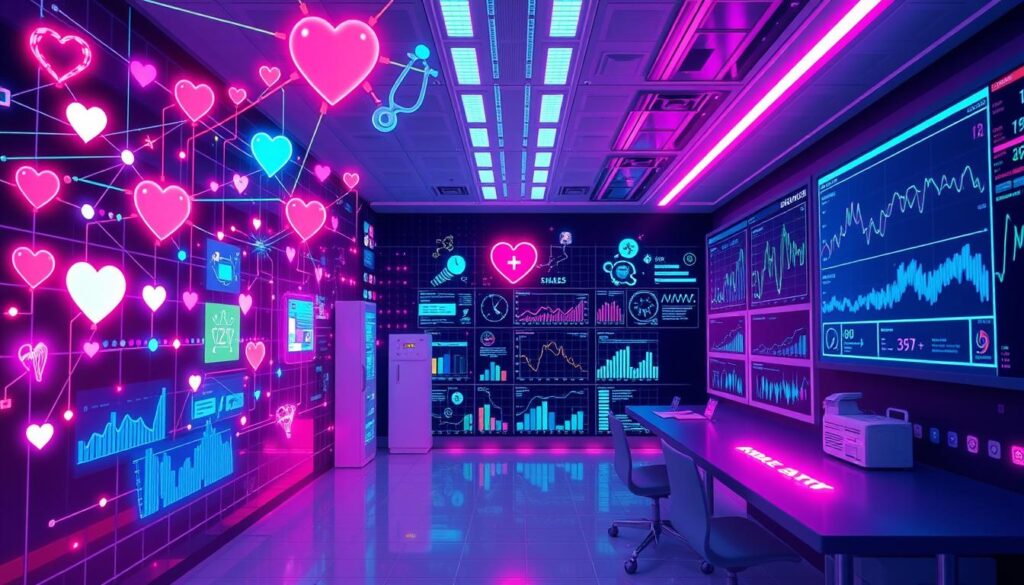
“AI has the power to change healthcare. It automates tasks, improves decision-making, and makes treatments more personal.”
As AI use grows, healthcare will see big improvements. Patients will get better care, and work will be more efficient. This will also help with managing the healthcare workforce.
The Impact of AI Automation for Healthcare on Patient Care
AI automation is changing healthcare for the better. It’s making treatments more personal and accurate. This means patients get care that really fits their needs.
Healthcare chatbots and virtual assistants are big wins. They give patients quick help and info. This makes healthcare more focused on the patient. In fact, 75% of patients want care that’s as personal as in other sectors. AI is making this happen.
| AI Automation Impact | Key Benefits |
|---|---|
| Radiology | AI automation has shown performance on par with radiologists in breast cancer detection, indicating significant advancements in accuracy within this specialty. |
| Stroke Care | Implementing AI-driven stroke triage tools at Ochsner LSU Shreveport resulted in notable reductions in door-to-puncture and door-to-CT times, showing AI’s role in better stroke care. |
| Emergency Departments | Automation in emergency departments has led to smoother patient flow. This cuts down wait times and boosts patient care through better communication and workflow. |
AI and automation are changing many areas of healthcare. This includes radiology, heart care, brain health, and emergency rooms. As healthcare keeps using these new tools, the future looks bright. We can expect better patient outcomes, personalized medicine, and streamlined patient experiences.
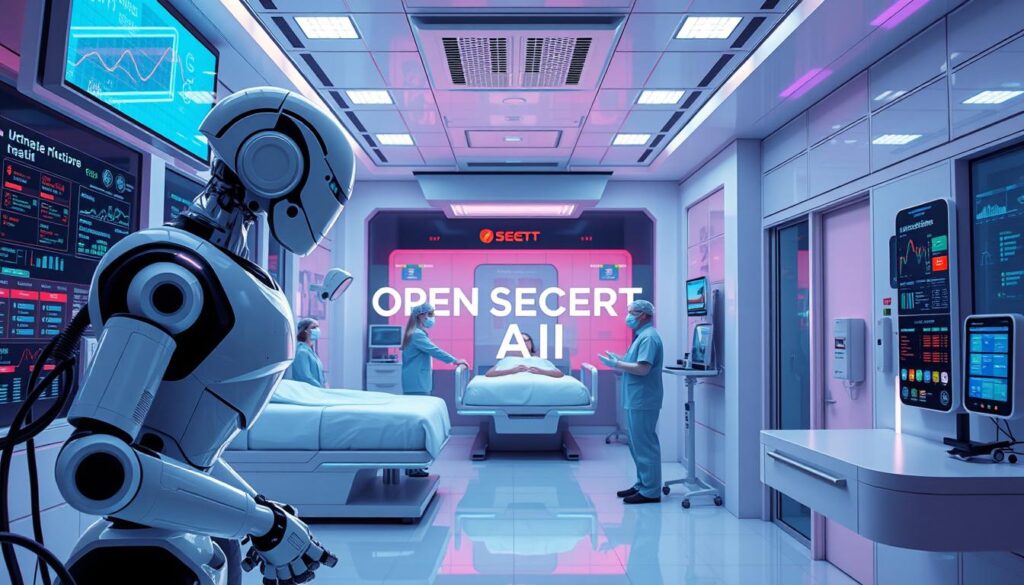
“AI-powered tools, such as healthcare chatbots and virtual assistants, provide timely information and support to patients, fostering a more patient-centric healthcare experience.”
Transforming Clinical Decision Support with Intelligent Systems
The healthcare world is changing fast, thanks to AI and machine learning. These smart systems help doctors make better choices. This leads to better care for patients.
Real-time Clinical Data Analysis
AI systems can look at lots of patient data at the same time. They use machine learning to find important patterns. This helps doctors make quick, smart decisions.
Risk Stratification and Predictive Analytics
These systems can predict how a patient might do in the future. They look at the patient’s data to suggest the best actions. This leads to better care and results.
Integration with Electronic Health Records
Linking CDSS with EHRs is key. It lets doctors see a full picture of a patient’s health. This makes their decisions more informed and safer.
AI is changing healthcare for the better. It helps doctors give more tailored and efficient care. As AI gets smarter, it will keep making healthcare better and safer for everyone.

“AI-enabled clinical decision support systems are transforming the way healthcare professionals make decisions, leading to better patient outcomes and more efficient care delivery.”
Revolutionizing Drug Discovery and Development Through AI
The pharmaceutical industry is changing fast thanks to AI and machine learning. AI looks through huge amounts of data to find new drug ideas. It helps make treatments that fit each patient’s needs.
AI makes picking and watching patients in clinical trials better. It guesses how well new drugs will work. This means drugs get made faster and cheaper. AI also makes treatments that fit each person’s genes, environment, and lifestyle. This leads to better care and happier patients.
| Key AI-Driven Advancements in Drug Discovery | Impact |
|---|---|
| Accelerated drug discovery process | Faster development cycles, reduced costs |
| Enhanced prediction of drug effectiveness and safety | Increased success rates, fewer failures |
| Optimized patient selection and monitoring | Improved clinical trial efficiency and outcomes |
| Personalized treatment plans | Tailored therapies, better patient outcomes |
AI is solving old problems in drug discovery like high costs and long times. It needs lots of data to work well. But the benefits are huge. AI could make treatments better, happier patients, and move science forward.
“AI has the power to change drug discovery. It could make new, better, and safer medicines faster.”
With AI, the future of drug making looks bright. These technologies could lead to new, important drugs. They will change healthcare for the better.
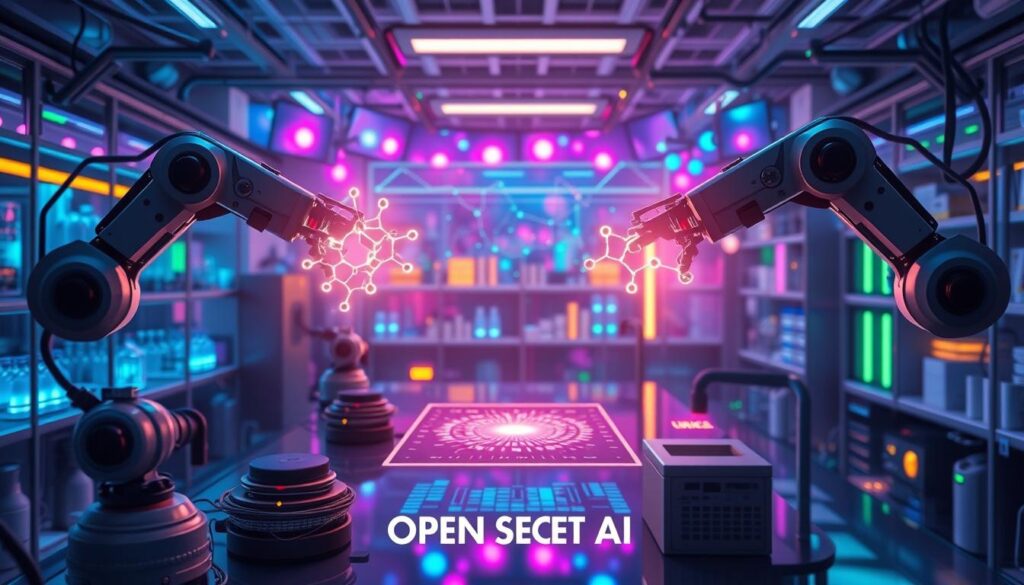
Enhanced Patient Data Management and Analysis
The healthcare world is changing fast, thanks to artificial intelligence (AI). AI is making a big difference in how we manage and analyze patient data. It helps doctors give better care by understanding each patient’s needs more clearly.
Automated Health Record Processing
AI tools are now handling EHRs for us. They find important information and cut down on the data overload doctors face. These smart systems quickly go through lots of patient data, spot patterns, and offer insights to help doctors make better choices.
Data Security and Privacy Measures
Keeping patient data safe is a big deal in healthcare. AI is leading the way in making data security better. It uses advanced methods to watch for threats, follow rules, and strengthen encryption. This keeps patient information safe and builds trust.
Interoperability Solutions
For a long time, healthcare systems have made it hard to share patient info smoothly. AI is fixing this with new ways to connect different data sources. This gives doctors a complete picture of a patient’s health, helping them provide better care.
AI is changing how we handle patient data, making healthcare smarter and more focused on patients. As AI keeps getting better, the future of healthcare looks bright and more tailored to each patient’s needs.
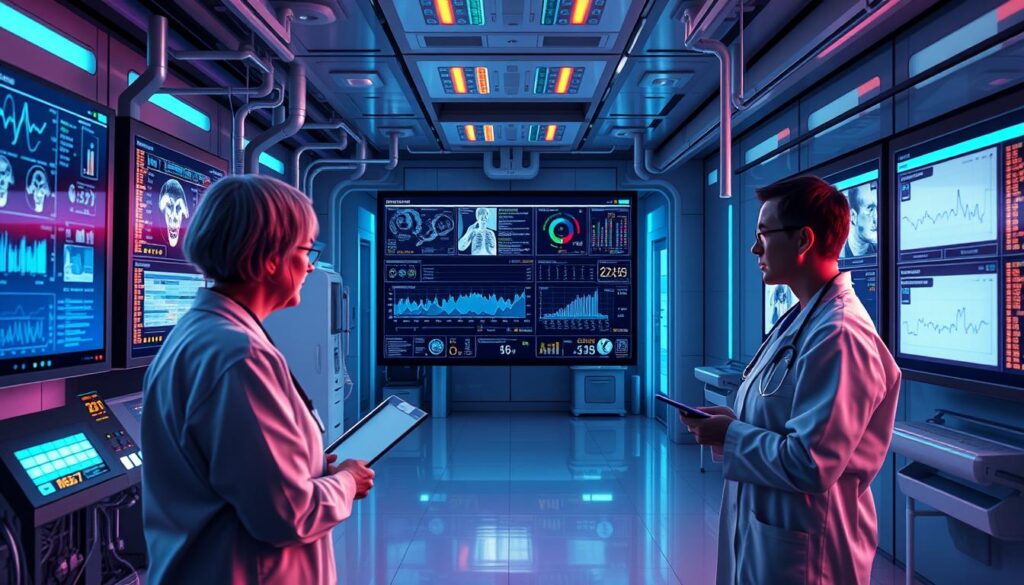
AI-Powered Genomics and Personalized Medicine
Artificial intelligence (AI) is changing genomics and personalized medicine. AI can look at big genetic data to make care plans for each patient. This leads to better health results. A study in Med showed AI’s role in making treatment plans during surgery.
AI helps in personalized medicine by speeding up data analysis. It finds new biomarkers and treatments. This lets doctors give care that fits each person’s genes, lifestyle, and environment. AI also helps in early disease detection, leading to better management.
But, AI in medicine raises concerns like privacy and data security. We need clear rules and open talks to use AI right in healthcare.
| Metric | Improvement |
|---|---|
| Patient Outcomes | Personalized medicine has improved patient outcomes due to tailoring medical interventions to individual genetic makeup, lifestyle, and environmental factors. |
| Data Analysis Speed | AI integration in personalized medicine speeds up data analysis, helping identify new biomarkers, genetic variants, and therapeutic targets. |
| Preventive Care | AI-powered personalized medicine enhances preventive care by identifying individuals at higher risk for certain diseases. |
| Continuous Learning | AI algorithms can continuously learn and adapt, refining and optimizing treatment plans for better patient outcomes. |
The use of AI in genomics in healthcare is promising. It helps doctors give more precise care through genetic testing. This leads to better health for patients.
“AI integration in personalized medicine speeds up data analysis, helping identify new biomarkers, genetic variants, and therapeutic targets.”
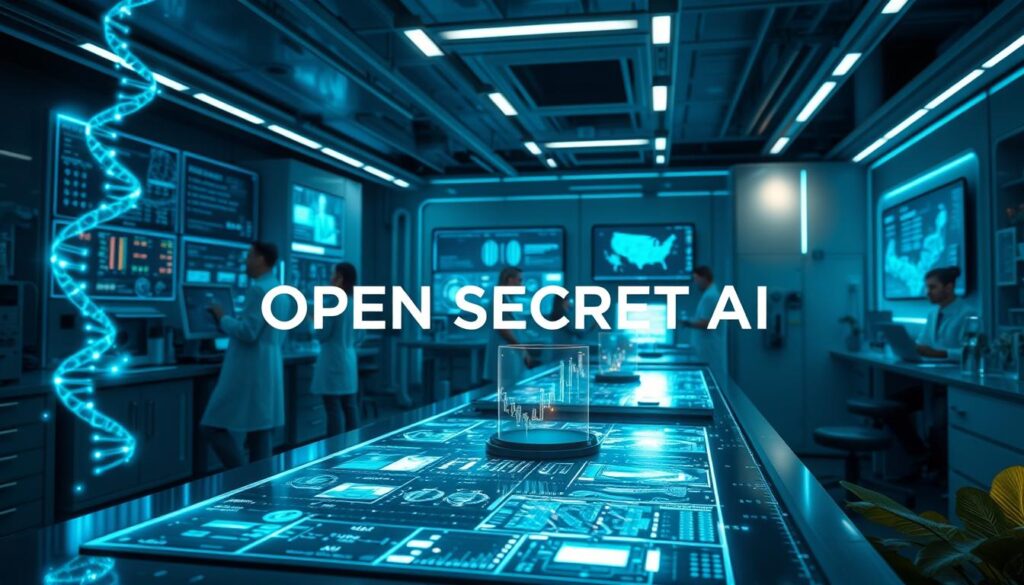
Streamlining Hospital Operations with Intelligent Automation
Hospitals are now using intelligent automation to make their operations smoother and improve patient care. These advanced technologies help manage resources, streamline workflows, and tackle staffing issues.
Capacity Management and Resource Optimization
AI systems are changing how hospitals manage their capacity and resources. They analyze data to predict patient needs, assign beds wisely, and use resources efficiently. This approach ensures quality care and prevents overcrowding.
Workflow Automation Solutions
Intelligent automation is also key in making hospital workflows more efficient. It automates tasks like billing and manages medications and supplies. This reduces errors, boosts efficiency, and lets doctors focus on patient care.
Staff Scheduling and Management
AI-powered scheduling systems are changing how hospitals staff their teams. They create schedules that consider everyone’s needs and preferences. This approach reduces overtime, improves staff morale, and boosts overall efficiency.
| Key Benefits of Intelligent Automation in Hospital Operations | Metrics |
|---|---|
| Reduced medication errors | Up to 50% decrease |
| Improved patient intake efficiency | Significant reduction in wait times |
| Enhanced supply chain management | Real-time inventory tracking and timely reordering |
| Optimized staff scheduling and resource allocation | Better coverage, reduced overtime costs, and improved staff morale |
| Streamlined administrative workflows | Reduced paperwork and faster reimbursement processes |
By adopting intelligent automation, hospitals can achieve greater efficiency, cut costs, and improve patient results. As healthcare evolves, these technologies will be essential for managing hospitals effectively.
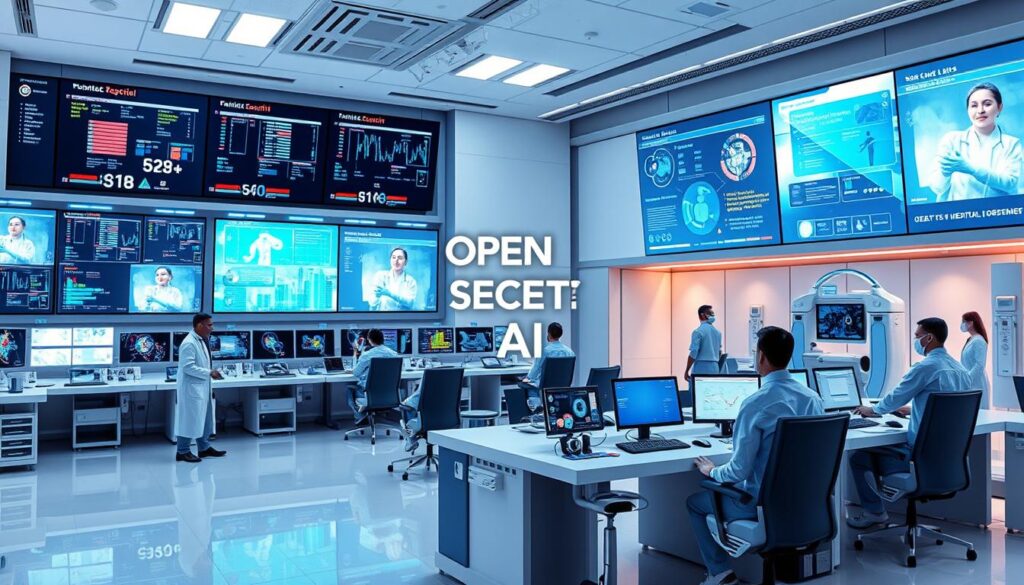
Addressing Healthcare Workforce Challenges Through AI
The global healthcare industry is facing a big challenge. By 2030, there could be a shortage of 10 million health workers, says the World Health Organization. This shortage is due to an aging population, more healthcare needs, and doctors working harder.
But, artificial intelligence (AI) is helping solve these problems. AI makes healthcare operations smoother and boosts what doctors can do.
AI is key in cutting down on paperwork for doctors. It handles tasks like entering data, scheduling appointments, and coding medical records. This lets doctors spend more time on patient care.
In the UK, using AI could save over 7.2 million hours a year in hospitals. In primary care, doctors could save 10-20% of their time on paperwork. AI can make this work easier.
AI is also changing how doctors are trained. It uses virtual patients and simulations for hands-on learning. This prepares doctors for a future with AI.
This means the next generation of doctors will be ready to use AI. They will improve patient care with AI and automation.
| Country | Healthcare Workforce Gap |
|---|---|
| England | Deficit of 260,000 to 360,000 doctors, nurses, and allied health professionals by 2036 |
| Saudi Arabia | Requires at least 20,000 more doctors by 2030 |
| Gulf Countries | Healthcare demand projected to increase by 240% over the next two decades |
AI in medical education and automating tasks are promising solutions. They make healthcare workers more efficient and skilled. This helps meet the need for more doctors and ensures patients get the care they need.
“Most healthcare leaders (92%) believe that automating tasks is key to solving staff shortages.”
Breaking Down Implementation Barriers and Future Perspectives
The healthcare industry is slowly adopting AI, but there are many challenges. Data privacy, the need for new infrastructure, and training the workforce are major hurdles. These barriers make it hard for AI to be widely used in healthcare.
Despite these challenges, AI’s benefits are driving its adoption. It can improve patient care and make hospitals run better. A study showed AI research in healthcare has grown by 5.12% each year for 28 years. This growth focuses on making care better and more efficient.
AI’s role in healthcare is set to grow. It will help with remote care, mental health, and personalized medicine. But, using AI responsibly and ethically is key to its future in healthcare.
| Barrier | Percentage |
|---|---|
| Data quality and accessibility | 64% |
| Lack of data governance programs | 28% |
| High costs of AI implementation | 43% |
| Shortage of AI-skilled workforce | 39% |
To overcome these challenges, healthcare needs to focus on several areas. It must improve data integration, set up strong data governance, and train workers in AI and data analytics. By tackling these issues, AI can greatly improve healthcare in the future.
“The future of healthcare is undoubtedly tied to the responsible and ethical implementation of AI. As we navigate this transformative technology, we must ensure that patient privacy, data security, and equitable access to care remain our top priorities.”
Conclusion
AI automation has changed healthcare in big ways. It’s making medical care better and more efficient. This tech is helping doctors and hospitals work smarter, not harder.
The market for healthcare automation is growing fast. It’s expected to hit $42.24 billion by 2024. Hospitals and diagnostic centers are leading the way, making up 49.2% of the market.
Automation in therapy areas is also on the rise. It’s making up 54% of the revenue and growing at 9% each year.
AI is saving the healthcare industry a lot of money. In 2023, it saved $193 billion. By 2026, it could save up to $150 billion more, says McKinsey.
AI is making medical billing easier and helping doctors make better decisions. It’s also making medicine more personal. The impact of AI in healthcare is huge. As we keep using these healthcare innovations, the future of medicine will be better for everyone.
FAQ
What is the projected growth of the AI automation market in healthcare?
The AI automation market in healthcare is expected to grow to 7.95 billion by 2030. This growth will change the industry, improving patient care and data analysis.
How are AI and machine learning impacting modern healthcare systems?
AI and machine learning are key in today’s healthcare. They help with advanced data processing and predictive analytics. These technologies are part of healthcare AI systems, which include tools for natural language processing and data analysis.
How is AI automation influencing patient care?
AI automation is changing patient care in big ways. It helps create personalized treatment plans and improves diagnosis accuracy. AI tools, like chatbots, also support patients, making care more focused on them.
What is the role of AI in clinical decision support?
AI is changing clinical decision support by analyzing data in real-time. It helps with risk assessment and predictive analytics. AI systems work with electronic health records, giving a better view of patient health.
How is AI transforming drug discovery and development?
AI is making drug discovery faster and more efficient. It optimizes processes and improves quality control in drug manufacturing. AI has even designed new molecules to fight SARS-CoV-2, showing its power in drug development.
What is the impact of AI on patient data management and analysis?
AI is making patient data management better. It automates health record processing and improves data security. AI tools help find valuable insights in electronic health records, making it easier for doctors to work.
How is AI advancing genomics and personalized medicine?
AI models analyze genetic data to tailor treatments, leading to personalized medicine. AI tools do genomic profiling in real-time, improving patient care through tailored treatments.
How is AI streamlining hospital operations?
AI is making hospital operations more efficient. It optimizes resource use and improves scheduling. AI systems help manage staffing and scheduling, solving problems in hospital management.
How is AI addressing healthcare workforce challenges?
AI is tackling healthcare workforce issues by automating tasks and reducing burnout. AI tools handle administrative tasks, letting doctors focus on patients. It also enhances medical education.
What are the challenges and future perspectives of AI implementation in healthcare?
Implementing AI in healthcare faces challenges like data privacy and infrastructure needs. But, AI’s benefits in patient care and operations are driving its use. The future includes more AI in remote care, mental health, and personalized medicine, with a focus on ethical use.
